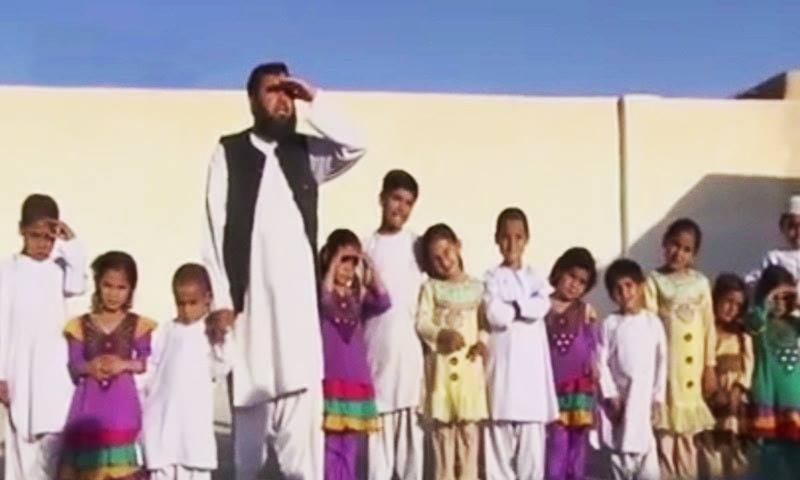QUETTA: A resident of Quetta, Jan Mohammad, who has fathered 33 children from three wives says he is living a happy life with his large family. "The bigger the family, the better," says 43-year-old Jan, the father of 19 daughters and 14 sons.
Jan, who considers himself "young at heart", is expecting two more baby girls this year, with one of his wives expected to deliver a daughter this week.
A doctor and trader by profession, Jan, says he cares for his children himself and the only difficulty he encounters is that he often forgets their names.
Also read: N Waziristan operation spoils fourth wife dream of father of 36
The large family lives in Quetta's eastern bypass area on the outskirts of the city, a remote neighbourhood inhabited by low-income families.
"I spend about Rs100,000 a month to educate my children," says Jan, whose children range between one and 16 years old. His favourite child is his eldest daughter, Shagufta Nasreen, who is studying in the ninth grade.
"When Papa comes home, I am the first to open the door as soon as possible so he doesn’t have to stand outside," she says with a smile.

When asked about his decision to have such an unusually large family, Jan says: "I had only one brother when I was growing up, and I was very fed up with that reality. I always wanted a large family."
Jan's large family came into the media limelight when he requested multiple copies of the Form B for his children, a request which Quetta’s Deputy Commissioner rejected, deeming the number suspiciously high.
But the Quetta Metropolitan Corporation has issued birth certificates for all of Jan’s children and he has an official ration book from 1974 as an ID document,
Journalist Zofeen T. Ebrahim, who often writes on Pakistan's demography says the trend of having such large families underscores the need to have a population count.
"We're bringing too many babies in this world and there is no plan to absorb them effectively," she tells Dawn.com.
"We can't have a one-child policy so we need to think intelligently on how to bring about a change in the mindset."
She stresses the need for a census. "A census is not just knowing the numbers — it gives a window into the household and how it is living its life."
She adds, "It helps demographers understand the country's population and the direction it is taking. Their input helps in informing a government's policy towards best and most strategic ways to invest in the human capital. Without knowing how many we are, its like policy makers taking a shot in the dark and hoping they get it right."
Ebrahim feels the lack of a population census since 1998 means "we cannot make intelligent and informed decisions on how to make investments that contribute to having small, manageable and healthier families".
"We can never achieve our full potential for economic growth that comes through a demographic dividend."
Dawn Editorial: Census delay
A year has passed since the Council of Common Interests debated the census as part of its agenda item, yet the demographic exercise is no closer to being held today than it was last year.
Everybody agrees that the last census conducted in 1998 is hopelessly out of date, and they all believe that this is a serious problem.
Consider the important issues that are built around the availability of census data: the NFC award, delimitation of electoral constituencies, seat shares in parliament, local bodies polls, targeted subsidies, and all other policy matters that rest on population data.
With the census data from 1998 practically obsolete, it is fair to suppose that all of these important matters today are actually based on suppositions that have no grounding in measured reality. Without a clean and impartial census, we don’t really know the face of the country that we are trying to run and govern.
A new census is badly needed but the obstacles that stand in its way are formidable and need to be acknowledged. At the heart of the foot-dragging is the demographic make-up of Sindh that nobody is very keen to talk about. With the massive population influx over the years, it stands to reason that Sindh has changed in important ways, and the ethnic balance as well as its share in the total population has undergone a profound transformation.
The Sindhi, Mohajir and Pakhtun populations can shift the internal balance of the province, while the influx of people into Karachi, Hyderabad and Sukkur over the years can alter the share of the province in the total population of the country.
Parties that seek their electoral fortunes in Punjab are reluctant to confront the real picture of what the new population shares of the respective provinces are, since this could affect NFC allocations as well as deal a psychological blow if Punjab’s share of the total population were to dip below 50pc.
Sindh is already reeling from a complex ethnic-based power struggle and any new numbers on the ethnic make-up would upset an uneasy status quo.
With no takers at the national level, the census exercise is being endlessly delayed. But continuing with a fictitious status quo and making policies for a population mix that doesn’t exist any longer is no solution either.
The ruling party must take the lead in initiating a credible move towards a new census, while finding a way to make the exercise agreeable to everyone.
Perhaps the case of India can serve as a model, where they decided to freeze all seat shares in parliament irrespective of what the census revealed. That compromise paved the way for a political consensus around a new census, and could serve as a model for Pakistan too.
One way or another, this government must ensure that a census is held during its term.














































